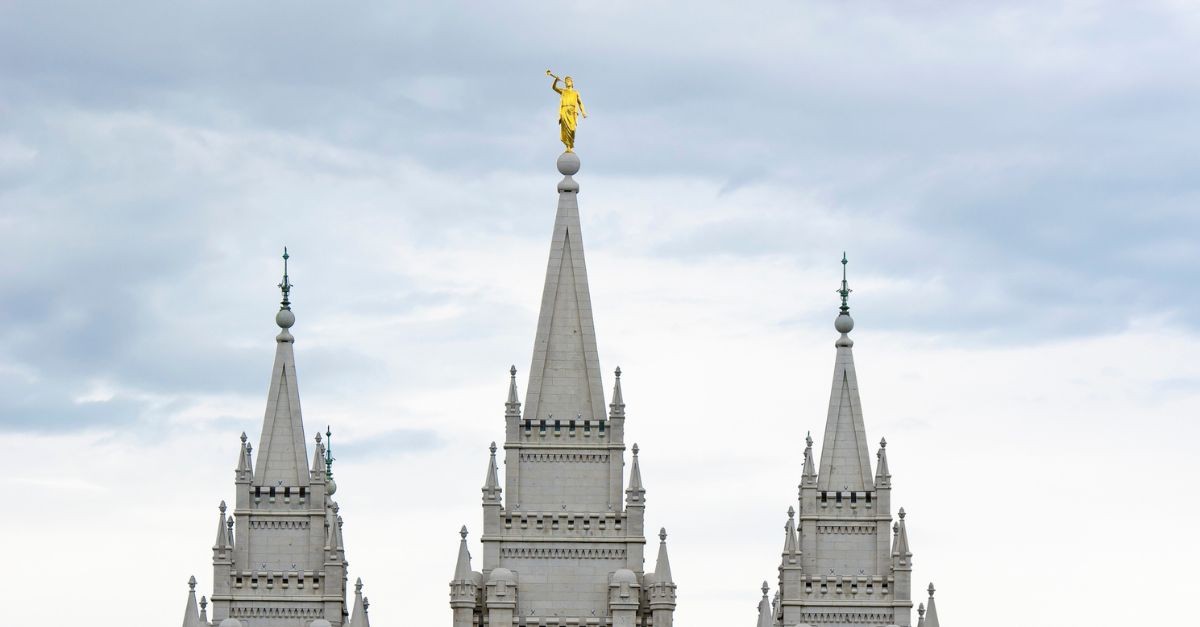
Today, approximately 6.7 million Mormons live in the US, a major religion, and chances are one is your friend.
Joseph Smith, Jr, founded Mormonism, officially known as the Church of Jesus Christ of Latter-day Saints (LDS), in upstate New York. Smith claimed to have had visions from God and translated ancient scriptures into what became the Book of Mormon. The religion grew quickly and migrated to the American West under the leadership of Brigham Young. Today, approximately 6.7 million Mormons live in the US.
As a Christian and a friend, it may be beneficial to ask questions regarding their beliefs, for your own education but also to begin important spiritual discussions about God and salvation. When asking these questions, we must be respectful and loving during these discussions. Even if we disagree with others, God calls us to love our neighbors and work for their good.
Here are 7 essential questions to ask Mormon friends.
Photo Credit: ©Getty Images/Brian Galbraith
1. On the Nature of God: “How do Mormons understand the nature of God, particularly in relation to the doctrine of the Trinity?"
Mormons, also known as members of The Church of Jesus Christ of Latter-day Saints (LDS Church), hold distinctive beliefs about the nature of God that differ from traditional Christian doctrine.
Mormons believe in God the Father, Jesus Christ, and the Holy Spirit as three separate and distinct beings, rather than the traditional Christian understanding of the Trinity as one God in three persons. They view God the Father as a glorified, perfected, and exalted being with a physical body, and Jesus Christ as his literal Son, distinct from the Father in nature and substance. Additionally, Mormons believe in the Holy Spirit as a personage of spirit, separate from the Father and the Son.
However, according to Christian doctrine from the Scriptures, the Trinity is understood as one God eternally existing in three distinct persons: the Father, the Son (Jesus Christ), and the Holy Spirit. This doctrine is affirmed in passages such as Matthew 28:19, where Jesus instructs His disciples to baptize “in the name of the Father and of the Son and of the Holy Spirit,” indicating the equal divine status of each person of the Trinity. Further, in John 10:30, Jesus clearly declares, “I and the Father are one.” Here, the passage affirms both Jesus and the Father as two separate people but also one.
2. “What is the Mormon perspective on Jesus Christ? How do Mormons view his divinity, role in salvation, and relationship with God the Father?”
From the doctrine of the Trinity, the person of Jesus becomes central to Christian faith and salvation. Mormons hold unique perspectives on Jesus Christ that differ from traditional Christian doctrine.
Mormons believe in Jesus Christ as the literal Son of God, born of the Virgin Mary, and the Savior and Redeemer of humanity. They regard Him as a divine being with a pre-mortal existence who volunteered to come to earth to atone for the sins of humanity and provide a way for individuals to return to God’s presence. Mormons also believe in Jesus’ role as the head of their church and the ultimate example of righteous living.
Many of these doctrines coincide with orthodox Christianity. However, according to traditional Christian doctrine rooted in the Bible, Jesus Christ is understood as the eternal Son of God, fully divine and fully human, who was sent by God the Father to reconcile humanity to himself through Christ’s sacrificial death and resurrection. Christians believe in Jesus’ divinity, his unique role in salvation as the only way to God (John 14:6), and his eternal relationship with God the Father as one of unity. Specifically, Christian doctrine differs in that Jesus isn’t simply another divine being but equal to the Father in divinity.
For Christians, engaging in this topic may involve discussing relevant passages such as John 1:1-14 and Colossians 1:15-20, which affirm Jesus’ divine nature and role as the mediator between God and humanity.

3. “How do Mormons understand salvation? What role do grace, faith, and works play in achieving salvation according to Mormon doctrine?”
Since Mormons have a different view of the person of Christ, who is central to salvation, Mormons then hold views on salvation, distinct from traditional Christianity.
Mormons believe in the importance of salvation and eternal life, viewing it as a process of spiritual progression toward becoming more like God. They emphasize the role of grace, faith, and works in achieving salvation, teaching that while grace is necessary for salvation, it must be accompanied by faith and obedience to God’s commandments. In Mormonism, this can become legalistic. Mormons believe in the concept of “exaltation,” wherein individuals can become gods themselves through faithful adherence to Mormon teachings and ordinances.
Certain elements are the same in traditional Christianity. Jesus' followers affirm salvation is understood as a gift of God’s grace, received through faith in Jesus Christ alone. The salvation comes through Christ alone. Through no other name can anyone be saved (Acts 4:12). Ephesians 2:8-9 states, “For it is by grace you have been saved, through faith—and this is not from yourselves, it is the gift of God—not by works so that no one can boast.” While Christians also believe obedience naturally comes from faith, and even in heavenly rewards, a believer’s obedience doesn’t make them exalted gods.
Photo Credit: ©Getty Images/meshaphoto

4. “Could you explain the significance of the Book of Mormon in LDS theology? How do Mormons view its relationship to the Bible?”
The Mormon doctrine of “exalted” ones comes from the Book of Mormon, a text separate from the traditional Bible. The Book of Mormon holds significant importance in LDS theology, serving as a foundational scripture alongside the Bible.
Mormons believe that the Book of Mormon is another testament of Jesus Christ, translated by Joseph Smith from ancient records revealed to him by an angel. They regard it as a companion to the Bible, providing additional teachings, prophecies, and accounts of God’s dealings with ancient inhabitants of the Americas. Mormons view the Book of Mormon as a witness to the divinity of Jesus Christ and a source of spiritual guidance and inspiration.
However, according to traditional Christian doctrine rooted in the Bible, the significance of the Book of Mormon is subject to scrutiny. While Christians acknowledge the value of studying additional religious texts, they prioritize the authority and primacy of the Bible as the inspired word of God. They question the historical accuracy and theological consistency of the Book of Mormon, particularly when those teachings conflict with the Bible.
Important to the discussion would be why Jesus needed to return again, especially when the Bible makes clear the next time Christ appeared would coincide with radical and apocalyptic events.
Photo Credit: ©Getty Images/Juanmonino
5. “What is the Mormon belief regarding prophets and ongoing revelation? How do Mormons understand the role of living prophets in guiding the church?”
Since Joseph Smith, who wrote the Book of Mormon, claimed to have had a special revelation for all people apart from the Bible, Mormons continue to teach different views on prophets and their role regarding religion.
Mormons believe in the principle of ongoing revelation, teaching that God continues to communicate with his people through living prophets and apostles. They regard Joseph Smith, the founder of their faith, as a modern-day prophet who restored the true church of Jesus Christ and received divine revelation to guide the church in the latter days. Mormons also believe other men since then have had continued revelation where God provided guidance, instruction, and doctrinal clarification through these modern-day apostles and prophets.
However, in the Scripture and traditional Christian teaching, the role of prophets is understood differently. While Christians affirm the importance of prophetic ministry in biblical times, they believe that the prophetic office was fulfilled in Jesus Christ, who is the final and ultimate revelation of God (Hebrews 1:1-2). Christians also regard the Bible as the inspired and authoritative word of God, containing all that is necessary for faith and practice (2 Timothy 3:16-17). Believers operate in a gift of prophecy, a supernatural gift of the Spirit, giving targeted oracles and messages to the church and others. However, those messages should always align with previous revelation, primarily the Bible, and never reinterpret it for new doctrines contrary to apostolic truth in Scripture.
6. “How do Mormons understand the concept of eternal families and the afterlife? What role do families play in Mormon theology?”
Stemming from the Book of Mormon, the LDS Church holds unique perspectives on the nature of the afterlife and the eternal significance of families.
Mormons believe in the continuation of family relationships beyond death, teaching that marriages performed in LDS temples can be sealed for eternity through priesthood authority. They view the family unit as central to God’s plan for humanity, emphasizing the importance of familial bonds and relationships in the eternal progression of individuals. Mormons believe that families can be together forever in the afterlife, united in love and purpose for eternity.
However, when reading the New Testament, Christians understand the concept of families differently. While Christians affirm the importance of familial relationships and the value of marriage here on earth, they believe that the primary focus of the afterlife is on one’s personal relationship with God through faith in Jesus Christ. Christians emphasize the hope of being united with God in heaven for eternity, rather than the continuation of earthly family relationships.
In fact, Jesus specifically gives a parable dealing with this idea. In Matthew 22:23-30, the Sadducees (who didn’t believe in an afterlife) spoke of a hypothetical in which a person married several people. Who would he or she be married to in heaven? Jesus corrected them, saying they didn’t know the Scripture or the power of God. In heaven, people won’t be married or given in marriage.

7. “What are some of the ways Mormons engage with their communities and participate in outreach efforts? How does Mormonism impact daily life and community involvement?”
A big part of Mormon life entails being actively engaged in various community service and outreach initiatives as part of their commitment to living out their faith.
Mormons strongly emphasize serving others and engage in a wide range of community service projects, including humanitarian aid, disaster relief, and charitable endeavors aimed at addressing the needs of individuals and communities locally and globally.
Mormons participate in missionary work as a central aspect of their faith, seeking to share the teachings of Jesus Christ and the message of the restored gospel with others. They often engage in door-to-door evangelism, community outreach events, and online missionary efforts to connect with individuals and invite them to learn more about their faith. Every Mormon is supposed to spend a certain amount of time, around 2 years, as missionaries for their faith in other cities or countries.
The Mormon model of outreach came from traditional Christianity, so they operate similarly in many respects. Christians also affirm the importance of serving others and sharing the Gospel, from the Great Commission given by Christ. Traditional Christians emphasize charity, generosity, and helping the poor along with sharing the Gospel of salvation through faith in Jesus Christ and may engage in evangelism and outreach efforts with a focus on biblical teachings and principles. However, Christians don’t generally require a year or two of missionary work for each believer. While Christians may not believe in a legalistic requirement as such, believers could learn from the dedication of every Mormon to spread the Gospel.
For those Christians with Mormon friends, this becomes an amazing opportunity to show interest in what people believe and how your friend interprets and practices those beliefs. At the same time, Christians can share their own experience and views in a fruitful exchange where at least two people better understand each other, show support, comprehend what they have in common, or perhaps reevaluate beliefs and personal traditions. Again, remember to broach such subjects with love and respect, desiring to deepen friendships instead of winning arguments.
Photo Credit: ©Getty Images/fizkes

Originally published Tuesday, 07 May 2024.
